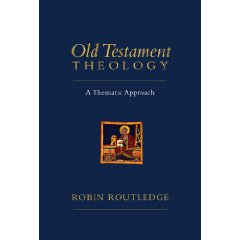 Robin Routlege’s Old Testament Theology took me a while to finish and in that time i have weighed how it is that I should/would review this book. First, I am not an OT Scholar, so I may not be qualified to give an ample review of Routledge’s book, but I will give it my best shot.
Robin Routlege’s Old Testament Theology took me a while to finish and in that time i have weighed how it is that I should/would review this book. First, I am not an OT Scholar, so I may not be qualified to give an ample review of Routledge’s book, but I will give it my best shot.
The Good:
I found many quotable quotes in this book. In fact, until I thumbed back through it to write this review, I didn’t realize how much underlining and note-taking I had done in this book. I was especially glad to see an OT Theology book that kept Christ in view as it sought to deal with the OT text. If one thing is certain, Routledge does understand and informs the reader regularly that the OT finds its ultimate fulfillment in Christ, not in the literary masterpiece that it is by itself.
Further, Routledge covers a wide array of subjects and topics in this thematic approach to OT theology. Themes include Approaches to OT theology (this section is exhaustive), God and teh ‘gods’, God and creation, God and the future, and my favorite section, God and the nations, which includes this quote:
A proper consideration of mission in the OT cannot limit discussion to its root meaning of ‘sending’ or ‘being sent.’ Mission for God’s people, particularly in the OT, is participation in God’s mission, which, as we have seen, has as its goal the revelation of his holiness and glory throughout the whole created order.
The Bad:
As is often the case with OT scholars, Routledge seems to hold to the old documentary hyphothesis in much of his writing. He holds to a late date with the book of Daniel, and seems to see no problem in suggesting that what the OT calls prophecy was merely a retelling of events that had already come to pass. The documentary hypothesis does not square well with an understanding of God’s word as authoritative, inerrant, and infallible.
The Ugly:
Though the table of contents lays this book out in a fashion that appears to be systematic and easy to approach, I found the structure of the book to be jumbled and disjointed. The author seemed to jump at times from discussions about particular books to particular authors, to roles and types of literature. I found it difficult to follow.
Conclusion:
By and large, the book is good. The first 79 pages are an historical overview of OT theology and will be found to be of little use to pastors. However, the remainder of the book, is written absent of technical language and is filled with useful tidbits of knowledge about the OT. If you need another OT resource on your shelf, this one may serve you well.

